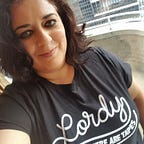An Eye for an Eye
The quest for a shared humanity in this violent world
My father had a pat response whenever I asked if he believed in God. “God and I have an understanding,” he said. “I leave Him alone and He leaves me alone.” It was an unsatisfying answer for a kid wrestling with big questions.
His break-up with God meant our Iranian-American family never went to church — or a mosque, for that matter — making us outliers in our small Ohio town, nestled on the border with Indiana and Kentucky. My religious education, as a result, was patchy.
There was the time my mom, raised as a Lutheran, secreted me and my brother away to Bible camp when my dad was in Iran for a month. I think it had less to do with giving us a religious education and more to do with the need for childcare. I remember coloring books with pictures of Jesus. And then there was a story about lepers, which led me to believe that battling skin disease was a major tenet of Christianity. An incomplete education.
Growing up in the 1970s Midwest, I was surrounded by kids who belonged to church youth groups. But there was no Bible study square dances for me. Well, there was the one I went to as someone’s guest. I remember asking the preacher, who seemed so dreamy with his blue eyes and Sean Cassidy hair, what happened to the Jews if only Christians got into Heaven. His answer? “God has a very special place for the Jewish people.” Indeed.
Adrift from religion, my family didn’t experience any of the positives that breaking bread with a congregation had to offer: regular fellowship around shared beliefs, a community’s comfort in times of trouble, collective service for a higher purpose. Instead, we mostly interacted with the proselytizers, the ones that focused on the code of conduct. Their stories made religion seem a little too punitive to me. Perform certain tasks and you got eternal life. Fail to do them, and you’re damned for eternity.
Fire and brimstone. Saints and sinners. An eye for an eye.
My father died a couple of years ago, still seemingly at odds with God. But cleaning out his house, I found a book of Persian poetry on his nightstand, written by Iran’s most famous poet, Hafiz. Hafiz is a 14th century truth teller, coaxing Persians into living a more meaningful life by looking for the divine here on Earth. He is revered, almost like a prophet. Hafiz’s poetry and the Holy Qur’an are the two most important books many Iranian families own.
To this day, Iranians look to Hafiz for wisdom by opening his poetry to a random page and seeking divination. Some even visit Hafiz’s tomb in Shiraz where, for a small fee, an elderly fortune teller will entice a canary to select a poem from a deck of cards. Whatever appears in its beak is the answer to your prayers.
Hafiz seemed like a strange book to find next to my atheist father’s bed. I asked my dad’s friend, Mohammed, about it.
“Your father wasn’t an atheist,” Mohammed said. “He didn’t trust religion; it caused a lot of problems in his eyes. But he had his own personal relationship with God.”
Imagine my surprise. I assumed my dad’s command to “leave God alone” was his way of saying: avoid the whole mess, turn away. But looking back, I’m no longer sure I understood.
My dad’s words came back to me when I learned about the horrible, heartbreaking tragedy in Sri Lanka. On Easter Sunday, ISIS-inspired fundamentalist Muslims killed hundreds of Catholic worshipers, retaliating for the recent Christchurch mosque massacre in New Zealand, where a lone gunman advocating white supremacy executed 50 Muslim worshipers during Friday prayers.
An eye for an eye. Tit for tat. A continuation of the long line of religious retribution tracing back to the 11th century Crusades and beyond. Retribution that has ensnared Muslims, Christians, Jews, Hindus, Buddhists, and other people of faith over the centuries.
I want to shrink from the horrible news of this latest tragedy. To focus on my own life and the problems that seem to mount higher as I get older. But in thinking about Sri Lanka — and New Zealand, Pittsburgh, Charleston and so many other places — turning my back is not a good option.
The paradox of enlightenment: despite so much human progress, we still haven’t learned the simple art of living together
I recently reread Reverend Martin Luther King Jr.’s Nobel Prize lecture. He gave the speech in December 1964, a year after the assassination of President Kennedy. President Lyndon Johnson had just been elected, the Vietnam War was churning, and the U.S. was spiraling toward the explosive violence of the late 60s. It reads like a sermon, one in which Dr. King reflects on the paradox of so much despair despite human enlightenment. He said:
“Modern man has brought this whole world to an awe-inspiring threshold of the future. He has reached new and astonishing peaks of scientific success. He has produced machines that think and instruments that peer into the unfathomable ranges of interstellar space…but we have not learned the simple art of living together as brothers.”
Like my father before me, I am not a religious person. But Dr. King’s words resonate with me.
To pursue the simple act of living together as brothers (and sisters). To build bridges. That’s what would be written on the card my yellow canary would pluck from its vast deck of possibilities.
It’s my Hafiz poem, my Psalm, my verse.
If I have a higher truth, that is it.
